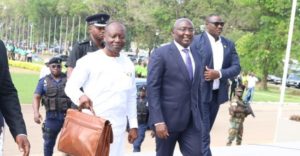
Accra, Ghana, September 25, 2018//-A renowned economist and Professor at the University of Cape Coast (UCC), John Gatsi, has advised the current managers of the Ghanaian economy to be humble enough to provide solutions to the concerns of the suffering citizens rather than casting invectives on them.
According to him, “Insulting fellow citizens merely because they express their frustration and suffering is not healthy”.
Prof Gatsi gave the advice following recent comments by some government officials on Ghanaians who complained about the general economic hardship, steep depreciation of the cedi against its major trading currencies especially the US Dollar, and rising prices of petrol products in the country.
He noted: “Listening to the cry of the people is part of good economic management. Our pastors, Imams, musicians, entrepreneurs and everybody is complaining but the government is divided on whether to accept the widespread suffering or not”.
The President now accepted it after key members of the government missed the opportunity to empathize with citizens. Some say there is no suffering and that in the suffering the government should be praised. Very soon all these maybe interpreted as arrogance”, Prof Gatsi added.
He continued: “No economic figure nor expressions is a substitute for the pains and hardship people go through. Improved economic management must improve livelihoods if it does not, the advice is listen to the people. Writing your achievements point by point when the suffering persists may amount to disruptive disregard for fellow citizens”.
Deliberate politicization undermines the beauty of economic data

Prof Gatsi told African Eye Report that economic management could never be an easy enterprise, explaining that there is some politics in reporting economic outcomes but deliberate politicization undermines the beauty of economic data and analysis.
For instance if the standard is that the only cause of exchange rate depreciation is mismanagement then observers have no choice but to assign same reasons anytime they observe and experience depreciation, he said.
In the past weeks there was the attempt to justify the erratic depreciation of the cedi to the dollar as a result of the appreciation of the dollar and a more attractive investment environment in the USA.
“In reality, erratic depreciation is an adjustment to pressure especially external but we now only see it in the light of whether the fundamentals are weak or strong. But who caused it?” Prof Gatsi questioned.
Comparing Ghana to Argentina, Turkey and others is misleading
On serious note Zambia, South Africa, Argentina and Turkey are all countries with weak fundamentals as revealed in recent economic management reports. We can’t discuss Zambia because it was in the news many times recently, according to him.
Prof Gatsi who is also the Head of Finance Department at the UCC Business School stressed: “Turkey is going through challenges because of the sanctions. Brexit is fundamentally disturbing the UK. Comparing our situation to these countries to claim that it is not cool anywhere is misleading”.
Comparing ourselves to fundamentally weak and troubling economies can mean only one thing that our own fundamentals are not helping, he added.
Performance of the cedi against other currencies
On the performance of the cedi against the other currencies, Prof Gatsi maintained: “The performance of the cedi against other currencies is of very little importance since the weight of dollar denominated demand and transactions are very high. So performance of the cedi compared to the dollar is of far-reaching importance than other currencies”.
“Perhaps it is time to interrogate the growth figures as they do not align with revenue figures. Take for example economic and financial data released by the Bank of Ghana (BoG) two days ago in which the tax to GDP ratio fell from 12.4% in October 2017 to 7.1% in June 2018”.
Total expenditure and arrears increased from 1.8% of GDP in January 2018 to 11.5% in June 2018. “This means we are now busily accumulating more arears. This must be alarming and a reflection of the true fundamentals of our economy. In the same document capital expenditure which was 2.2% of GDP in October 2017 has reduced to 1.1% in June 2018”, Prof Gatsi pointed.
The data also reported that both consumer and business confidence have reduced as Non-performing loans remain in the same grade with downward trend in inflation not aligned with high real lending rate within the same high historical average lending rate around 28%.
Implying that many are still borrowing at above 28% in the face of lower policy rate of 17%.
We must work together to address the fundamentals.
Paragraph 9 of September 24, 2018 Monetary Policy Committee (MPC) report indicated that Ghana’s public debt stock has reduced. “Total public debt decreased from 67.4 percent of GDP (GH¢137.5 billion) in July 2017 to 65.9 percent of GDP (GH¢159.4 billion) at the end of July 2018.
Of the total debt stock, domestic debt was GH¢73.8 billion accounting for 46.3 percent and external debt was GH¢85.5 billion with a share of 54.7 percent.” This is misleading, Prof Gatsi stated.
He however explained: “There is a difference between debt stock and Debt to GDP ratio. Declining Debt to GDP ratio when the growth does not generate revenue is not something to project”.
“The crucible of the matter is lower debt to GDP which is not productive in terms of revenue, jobs and opportunities for people in inclusive manner cannot be an anchor for borrowing.
The truth as indicated in paragraph 9 of the MPC press statement today, is that the public debt stock increased from GH¢137.5 billion at the end of July 2017 to GH¢159.4 billion at the end of August, 2018”.
African Eye Report


